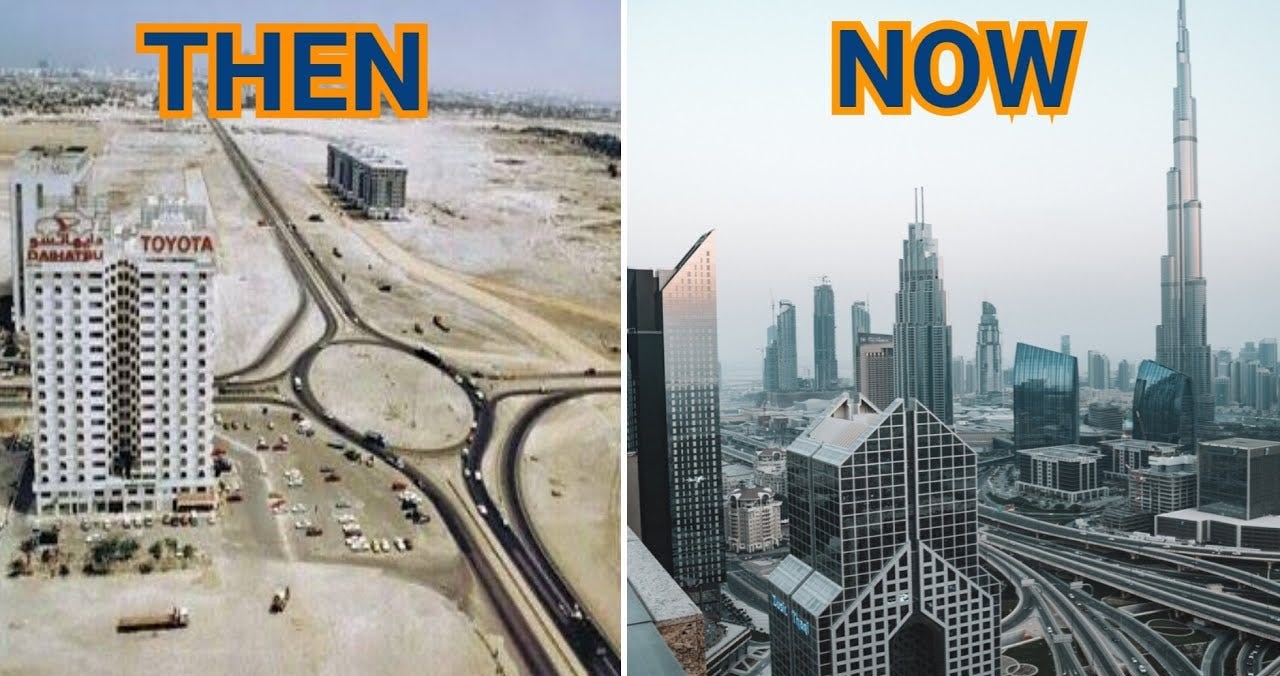The Evolution of Dubai’s Real Estate Market: From Desert to Global Icon
Dubai’s transformation from a desert outpost to a global metropolis is one of the most remarkable urban development stories of the 21st century. The city’s skyline, punctuated by architectural marvels like the Burj Khalifa and the Palm Jumeirah, is a testament to its rapid growth. But how did Dubai's real estate market evolve to become one of the most sought-after in the world? In this blog, we will explore the key phases and factors that have shaped Dubai's real estate market into the powerhouse it is today.
The Early Days: Foundations in the Desert
In the early 1980s, Dubai’s real estate market was modest, with limited residential and commercial properties mainly catering to the local population and a small number of expatriates. The city’s economy was primarily based on trade and oil, with little focus on real estate as a significant driver of growth. However, the visionary leadership of Dubai saw the potential to diversify the economy, and real estate became a central pillar of this strategy.
The 2000s: A Boom Like No Other
The early 2000s marked the beginning of Dubai's real estate boom. The launch of the freehold property law in 2002 allowed foreign nationals to own property in designated areas, sparking an unprecedented surge in demand. Developments like The Palm Jumeirah, Dubai Marina, and Downtown Dubai began to take shape, attracting investors from around the world.
This period also saw the rise of iconic projects like the Burj Khalifa, which became a symbol of Dubai's ambition and architectural prowess. The city’s focus on luxury living and high-end real estate attracted a global clientele, establishing Dubai as a premier destination for property investment.
The 2008 Financial Crisis: A Market Reset
The global financial crisis of 2008 had a significant impact on Dubai’s real estate market. Property prices plummeted, and several high-profile projects were put on hold or canceled. The crisis exposed vulnerabilities in the market, particularly the reliance on speculative investments and rapid price increases.
However, Dubai’s leadership quickly implemented measures to stabilize the market. New regulations were introduced to protect investors, and the Real Estate Regulatory Agency (RERA) was established to oversee the market. These steps helped restore confidence and set the stage for a more sustainable growth trajectory.
Post-Crisis Recovery and Maturation
Following the financial crisis, Dubai’s real estate market entered a phase of recovery and maturation. Developers became more cautious, focusing on completing existing projects and delivering quality over quantity. The introduction of affordable housing projects catered to a broader audience, expanding the market’s appeal.
Expo 2020, originally planned for 2020 but held in 2021 due to the pandemic, played a crucial role in revitalizing the market. The event attracted international attention and investment, further solidifying Dubai’s status as a global real estate hub.
The Pandemic and Beyond: Resilience and Innovation
The COVID-19 pandemic presented new challenges for Dubai's real estate market, with lockdowns and travel restrictions initially slowing down activity. However, the market demonstrated remarkable resilience, quickly rebounding as the city implemented effective safety measures and remained open to business.
The pandemic also accelerated trends such as digitalization and the demand for flexible living spaces. Virtual property tours, remote transactions, and a focus on health and wellness features in residential developments have become the new norm. Developers are increasingly integrating smart home technologies and sustainable practices to meet evolving consumer preferences.
The Future: What Lies Ahead for Dubai’s Real Estate Market?
Looking ahead, Dubai’s real estate market is poised for continued growth and innovation. The city’s strategic location, world-class infrastructure, and commitment to innovation make it an attractive destination for investors and residents alike. Upcoming projects like the Dubai Harbour, District 2020 (the legacy of Expo 2020), and new master-planned communities will continue to drive the market forward.
Moreover, with the UAE’s focus on becoming a global leader in sustainability and smart cities, we can expect future developments to increasingly incorporate green building practices, renewable energy, and cutting-edge technologies.
Conclusion
Dubai's real estate market has come a long way from its humble beginnings, evolving into a global icon of luxury, innovation, and resilience. As the city continues to grow and adapt to new challenges, its real estate market remains a dynamic and lucrative sector, offering opportunities for investors and homeowners alike. Whether you're looking to invest in a new property or simply interested in the market’s evolution, Dubai’s real estate story is far from over—it’s just beginning.

